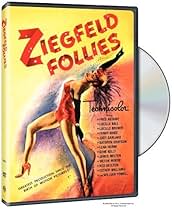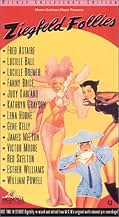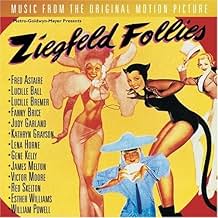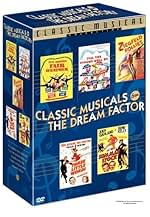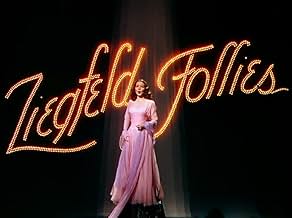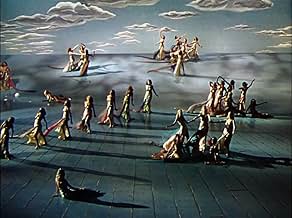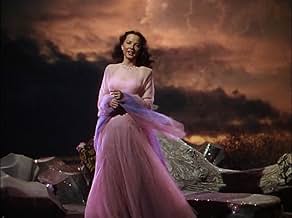ÉVALUATION IMDb
6,4/10
3,9 k
MA NOTE
Le regretté grand imprésario Florenz Ziegfeld Jr. regarde du ciel et décrète une nouvelle revue dans son grand style ancien.Le regretté grand imprésario Florenz Ziegfeld Jr. regarde du ciel et décrète une nouvelle revue dans son grand style ancien.Le regretté grand imprésario Florenz Ziegfeld Jr. regarde du ciel et décrète une nouvelle revue dans son grand style ancien.
- Prix
- 1 victoire et 1 nomination au total
Avis en vedette
Let's give this movie credit for one thing: it doesn't claim to be anything other than what it is: an unconnected series of musical numbers and comedy sketches, meant to honor the late Florenz Ziegfeld. So, if that is what you want, terrific. If a particular scene bores you, you can fast-forward through it without missing anything.
The strength of the film was the wise decision to let Fred Astaire appear in more than one number. His dancing and on-screen personality are always delightful, because his joy in performing is obvious and catching. The highlight of the movie comes in the last performance, when he performs a wonderful tap-dance and singing number with Gene Kelly. They are so palpably having a good time that you almost forget how dreary so much of the rest of the film was!
The comedy sketches are absolutely the most miserable and un-funny things ever captured on celluloid. Painful, painful, painful. Good grief, do they drag on forever. Keenan Wynn performs an old Vaudeville sketch in which a man cannot get the operator to put his call through to a nearby number, while a parade of other characters have no problem putting calls through to the most obscure and distant locations on the planet. Potentially funny, yes? Well, yes, when Lou Costello did it two years earlier in "Who Done It" - that was the definitive version of the sketch. It is one of the funniest things Lou ever did. Why in the world would MGM have Wynn try to do the same sketch - he tries very hard to mimic Lou Costello's facial contortions and grunts and squeals of frustration - but it stinks.
And the "Pay him the two dollars" routine with Victor Booth and Edward Arnold - well, if this represents Vaudeville at its best, then I guess I don't regret not having been alive to see it after all. And Victor Hume takes a rare stab at comedy too; he appears to be trying to mimic Shemp Howard, and none too well at that.
The musical numbers in general are what you would expect from MGM - lavish, expensive-looking, and otherwise spectacular.
While it may not be everyone's cup of tea, I actually enjoyed the claymation at the beginning of the movie. One of the most bizarre and surreal scenes in any MGM movie ever has to be the 45 seconds of Eddie Cantor, in glorious claymation, and in blackface, for goodness sake, singing "If you knew Susie". It is hilarious, and the claymation really captures Cantor's performance style to a Tee - for comparison, I strongly suggest you watch "A Few Minutes with Eddie Cantor" (1923, in sound) on Youtube.
And speaking of classic Hollywood racial insensitivity, a long "drama in pantomime" features Fred Astaire and as a Chinese, stalking another white actress pretending to be Chinese. You really have to shake your head. And are Fred and Gene dancing in front of a statue of Civil War General Nathan Bedford Forrest? Perhaps not, but he sure looks Confederate....
Like I said, Ziegfeld Follies gives you get exactly what it claims to give you. But have the fast-forward ready.
The strength of the film was the wise decision to let Fred Astaire appear in more than one number. His dancing and on-screen personality are always delightful, because his joy in performing is obvious and catching. The highlight of the movie comes in the last performance, when he performs a wonderful tap-dance and singing number with Gene Kelly. They are so palpably having a good time that you almost forget how dreary so much of the rest of the film was!
The comedy sketches are absolutely the most miserable and un-funny things ever captured on celluloid. Painful, painful, painful. Good grief, do they drag on forever. Keenan Wynn performs an old Vaudeville sketch in which a man cannot get the operator to put his call through to a nearby number, while a parade of other characters have no problem putting calls through to the most obscure and distant locations on the planet. Potentially funny, yes? Well, yes, when Lou Costello did it two years earlier in "Who Done It" - that was the definitive version of the sketch. It is one of the funniest things Lou ever did. Why in the world would MGM have Wynn try to do the same sketch - he tries very hard to mimic Lou Costello's facial contortions and grunts and squeals of frustration - but it stinks.
And the "Pay him the two dollars" routine with Victor Booth and Edward Arnold - well, if this represents Vaudeville at its best, then I guess I don't regret not having been alive to see it after all. And Victor Hume takes a rare stab at comedy too; he appears to be trying to mimic Shemp Howard, and none too well at that.
The musical numbers in general are what you would expect from MGM - lavish, expensive-looking, and otherwise spectacular.
While it may not be everyone's cup of tea, I actually enjoyed the claymation at the beginning of the movie. One of the most bizarre and surreal scenes in any MGM movie ever has to be the 45 seconds of Eddie Cantor, in glorious claymation, and in blackface, for goodness sake, singing "If you knew Susie". It is hilarious, and the claymation really captures Cantor's performance style to a Tee - for comparison, I strongly suggest you watch "A Few Minutes with Eddie Cantor" (1923, in sound) on Youtube.
And speaking of classic Hollywood racial insensitivity, a long "drama in pantomime" features Fred Astaire and as a Chinese, stalking another white actress pretending to be Chinese. You really have to shake your head. And are Fred and Gene dancing in front of a statue of Civil War General Nathan Bedford Forrest? Perhaps not, but he sure looks Confederate....
Like I said, Ziegfeld Follies gives you get exactly what it claims to give you. But have the fast-forward ready.
If you're watching ZIEGFELD FOLLIES expecting a plot of any kind, or even an attempt at one, you'd probably be quite horrifically let down by this film. It's best to approach and accept it for what it is--a crazy filmic patchwork of song and dance and sketches, with some that undoubtedly work better than others, and some that are best left forgotten in the annals of film history. If you *do* bear this in mind, ZIEGFELD FOLLIES is an amusing way to spend a couple of hours as you watch these famous stars, including Fred Astaire, Lucille Ball, Gene Kelly, Judy Garland and many many more trying their utmost best to entertain you. (Admittedly, some with better success than others!)
The film opens with William Powell as Florenz Ziegfeld (reprising his role in THE GREAT ZIEGFELD for what really amounts to a cameo), looking down from heaven as he plans to put up one last, great Ziegfeld follies using the best stars of the day. What immediately follows is the trademark very very pink number, with girls galore floating by on merry-go-round horses, that segues into a rather surreal bit with Lucille Ball (properly attired in a pink fluffy concoction) brandishing a whip (oh dear) against several girls in very sexily-cut black leather body suits. It's an... interesting way to kick the film off, let's leave it at that.
There's no real way to summarise ZIEGFELD FOLLIES except by singling out one's own favourite numbers. And in the forest of boring (Keenan Wynn wastes his talents in a grating and predictable phone sketch), over-the-top (feast your eyes on Esther Williams' water ballet or Kathryn Grayson's operatic warbling as Cyd Charisse dances through bubble mountains) and just plain weird (Judy Garland performing what could well be the first rap in Classic Hollywood--it's not an altogether pretty picture), all of Astaire's contributions to the film stand out.
Astaire is the ostensible star of the film, appearing no less than four times with three gorgeous dance sequences that could certainly count among his personal best. In two of them he's partnered with Lucille Bremer to pleasing effect. "This Heart Of Mine" features Astaire in his rogue persona as he romances Bremer with dance (doesn't he always?) only to steal her jewelry... and for her to steal his heart. The better of their collaborations is the odd but intriguing "Limehouse Blues" with the two of them made up like Chinese (Astaire almost--*almost*--carries it off but ends up looking a little silly). Leaving aside stereotypes, the ballet in Tai Long's fevered dreams is quite stunning, and impeccably staged. I'm still trying to figure out how Astaire and Bremer managed to remember the exact way in which to flip their fans... I hate to think how many times they must have reshot that just to get it all perfectly synchronised!
My favourite number in ZIEGFELD FOLLIES, small surprise, is the one I was looking out for: the penultimate number, "The Babbitt & The Bromide", featuring Astaire and Kelly together on screen, performing the same routine for once in their long illustrious careers. It's a funny little number, with the two fellows they play meeting each other at every stage of their lives, only to have the same inane, mundane conversation. Then follows a small bout of onemanupship as they try to out-dance the other, right into the gates of Heaven. Watching them together is a real treat, because you know these are probably the two best dancer/singer/actors ever committed to film. It's a bit of a shame that their styles don't quite gel: Astaire floats his way through the routine as Kelly pounds the ground as only he can, so their dancing is polished, in perfect time (the timing is absolutely amazing!), but just a little bit off-kilter. It's still the best number in ZIEGFELD FOLLIES though, with Kelly's irrepressible mischief playing against Astaire's ruffled charm.
ZIEGFELD FOLLIES is really just a big, sparkly candy box of a movie--if you bear in mind that a plot was never particularly high on the mind of writers, producers, or directors, and you have a good book by your side to tide you through the (fortunately not too numerous) stretches of boredom, you're set for the evening. Keep the video ready for whenever Astaire breaks onto the screen; that's always a sign of quality. 7/10
The film opens with William Powell as Florenz Ziegfeld (reprising his role in THE GREAT ZIEGFELD for what really amounts to a cameo), looking down from heaven as he plans to put up one last, great Ziegfeld follies using the best stars of the day. What immediately follows is the trademark very very pink number, with girls galore floating by on merry-go-round horses, that segues into a rather surreal bit with Lucille Ball (properly attired in a pink fluffy concoction) brandishing a whip (oh dear) against several girls in very sexily-cut black leather body suits. It's an... interesting way to kick the film off, let's leave it at that.
There's no real way to summarise ZIEGFELD FOLLIES except by singling out one's own favourite numbers. And in the forest of boring (Keenan Wynn wastes his talents in a grating and predictable phone sketch), over-the-top (feast your eyes on Esther Williams' water ballet or Kathryn Grayson's operatic warbling as Cyd Charisse dances through bubble mountains) and just plain weird (Judy Garland performing what could well be the first rap in Classic Hollywood--it's not an altogether pretty picture), all of Astaire's contributions to the film stand out.
Astaire is the ostensible star of the film, appearing no less than four times with three gorgeous dance sequences that could certainly count among his personal best. In two of them he's partnered with Lucille Bremer to pleasing effect. "This Heart Of Mine" features Astaire in his rogue persona as he romances Bremer with dance (doesn't he always?) only to steal her jewelry... and for her to steal his heart. The better of their collaborations is the odd but intriguing "Limehouse Blues" with the two of them made up like Chinese (Astaire almost--*almost*--carries it off but ends up looking a little silly). Leaving aside stereotypes, the ballet in Tai Long's fevered dreams is quite stunning, and impeccably staged. I'm still trying to figure out how Astaire and Bremer managed to remember the exact way in which to flip their fans... I hate to think how many times they must have reshot that just to get it all perfectly synchronised!
My favourite number in ZIEGFELD FOLLIES, small surprise, is the one I was looking out for: the penultimate number, "The Babbitt & The Bromide", featuring Astaire and Kelly together on screen, performing the same routine for once in their long illustrious careers. It's a funny little number, with the two fellows they play meeting each other at every stage of their lives, only to have the same inane, mundane conversation. Then follows a small bout of onemanupship as they try to out-dance the other, right into the gates of Heaven. Watching them together is a real treat, because you know these are probably the two best dancer/singer/actors ever committed to film. It's a bit of a shame that their styles don't quite gel: Astaire floats his way through the routine as Kelly pounds the ground as only he can, so their dancing is polished, in perfect time (the timing is absolutely amazing!), but just a little bit off-kilter. It's still the best number in ZIEGFELD FOLLIES though, with Kelly's irrepressible mischief playing against Astaire's ruffled charm.
ZIEGFELD FOLLIES is really just a big, sparkly candy box of a movie--if you bear in mind that a plot was never particularly high on the mind of writers, producers, or directors, and you have a good book by your side to tide you through the (fortunately not too numerous) stretches of boredom, you're set for the evening. Keep the video ready for whenever Astaire breaks onto the screen; that's always a sign of quality. 7/10
No doubt the jaded postmodern cynical viewer will find plenty to pick apart in this fluff (facile metaphysics, etc.). That is their loss.
This is not one of the great MGM musicals, but at its best it does what great musicals do: it sweeps you along in a kaleidoscope of color, movement and sound. And because of these qualities this trifle IS art as surely as Citizen Kane or La Promesse are. Cinema is not just an art of--or forum for-- philosophy; it is an art of the color palette, and with The Ziegfeld Follies the technical forces of a great studio created a sometimes exquisite canvas to behold. Unfortunately, like many old films, the canvas is fading.
I first saw this film 20 years ago projected from an exceptional 16 millimeter print that brought out the full richness of the Technicolor cinematography. None of the video versions I've seen since have come close. The same is true for the 1949 John Ford western, She Wore a Yellow Ribbon, which I saw many years ago in an unbelievably painterly 16mm Technicolor print. Prints of that film shown on the AMC network don't even come close to the richness of that print.
Its color alone is enough to make The Ziegfeld Follies visually entertaining for me, and that print I saw long ago convinces me that is one of the 10 or 20 most beautiful color films ever made. The merry go round scene (with Lucille Ball as I recall) in hot garish pink was particularly striking visually.
I contend that any film, even marginal or bad ones, made in the extinct and impossible to resurrect Technicolor process is worthy of seeing, because its very usage constitutes a lost art form in and of itself.
Like Ziegfeld Follies, middling films such as Kid Millions (1934), Trail of the Lonesome Pine (1936), Jesse James (1939), Down Argentine Way (1940), The Gang's All Here (1943) and The Captain from Castile (1947) are worth seeing almost exclusively because of their amazing color schemes.
The biggest crack about "Tech," as cine buffs call it, is that it was not "realistic" color. Bogus line of reasoning, as no cinematic color process can ever be realistic in the sense of replicating human sight. OK maybe Roger Deakins came close in "Sid and Nancy." Admiring Ziegfeld Follies solely for its color may not be enough for you, but it's enough for me in our era of dreary cinematic color.
This is not one of the great MGM musicals, but at its best it does what great musicals do: it sweeps you along in a kaleidoscope of color, movement and sound. And because of these qualities this trifle IS art as surely as Citizen Kane or La Promesse are. Cinema is not just an art of--or forum for-- philosophy; it is an art of the color palette, and with The Ziegfeld Follies the technical forces of a great studio created a sometimes exquisite canvas to behold. Unfortunately, like many old films, the canvas is fading.
I first saw this film 20 years ago projected from an exceptional 16 millimeter print that brought out the full richness of the Technicolor cinematography. None of the video versions I've seen since have come close. The same is true for the 1949 John Ford western, She Wore a Yellow Ribbon, which I saw many years ago in an unbelievably painterly 16mm Technicolor print. Prints of that film shown on the AMC network don't even come close to the richness of that print.
Its color alone is enough to make The Ziegfeld Follies visually entertaining for me, and that print I saw long ago convinces me that is one of the 10 or 20 most beautiful color films ever made. The merry go round scene (with Lucille Ball as I recall) in hot garish pink was particularly striking visually.
I contend that any film, even marginal or bad ones, made in the extinct and impossible to resurrect Technicolor process is worthy of seeing, because its very usage constitutes a lost art form in and of itself.
Like Ziegfeld Follies, middling films such as Kid Millions (1934), Trail of the Lonesome Pine (1936), Jesse James (1939), Down Argentine Way (1940), The Gang's All Here (1943) and The Captain from Castile (1947) are worth seeing almost exclusively because of their amazing color schemes.
The biggest crack about "Tech," as cine buffs call it, is that it was not "realistic" color. Bogus line of reasoning, as no cinematic color process can ever be realistic in the sense of replicating human sight. OK maybe Roger Deakins came close in "Sid and Nancy." Admiring Ziegfeld Follies solely for its color may not be enough for you, but it's enough for me in our era of dreary cinematic color.
This film is just what it says on the tin, a collection of pieces and sketches similar to those you would have seen in a real Ziegfeld show.
Introduced from Heaven by Ziegfeld himself (William Powell reprising his role of ten years earlier), the acts are rolled out one by one for our appreciation and enjoyment.
High points which spring to mind are Fred Astaire as a jewel thief, charming Lucille Bremer; and as a Chinese n'er do well wishing he could get Bremer the fan she wants. Cyd Charisse and others dancing through bubbles as Kathryn Grayson warbles 'Beauty'. Judy Garland as 'the great lady' mocking Greer Garson. And of course 'The Babbitt and the Bromide' which teams Astaire and Gene Kelly for the first time.
The comedy segments sit less well today and all are too long, however, they're not bad. Keenan Wynn struggles with a dumb telephone operator; Victor Moore has a tightwad lawyer who gets him into jail; Fanny Brice wins the Irish sweepstake; and Red Skelton advertises Guzzler's Gin.
Add Lucille Ball and her cat girls, a touch of La Traviata, and a bevy of lovelies to open and close the show, and you can see why this film was a hit on its first release.
Good for historical interest and the frequent highs, but you might find your attention wandering now and then.
Introduced from Heaven by Ziegfeld himself (William Powell reprising his role of ten years earlier), the acts are rolled out one by one for our appreciation and enjoyment.
High points which spring to mind are Fred Astaire as a jewel thief, charming Lucille Bremer; and as a Chinese n'er do well wishing he could get Bremer the fan she wants. Cyd Charisse and others dancing through bubbles as Kathryn Grayson warbles 'Beauty'. Judy Garland as 'the great lady' mocking Greer Garson. And of course 'The Babbitt and the Bromide' which teams Astaire and Gene Kelly for the first time.
The comedy segments sit less well today and all are too long, however, they're not bad. Keenan Wynn struggles with a dumb telephone operator; Victor Moore has a tightwad lawyer who gets him into jail; Fanny Brice wins the Irish sweepstake; and Red Skelton advertises Guzzler's Gin.
Add Lucille Ball and her cat girls, a touch of La Traviata, and a bevy of lovelies to open and close the show, and you can see why this film was a hit on its first release.
Good for historical interest and the frequent highs, but you might find your attention wandering now and then.
The premise of this film is that Ziegfeld (with William Powell reprising his role) is in heaven thinking of his dream revue, with the rest of the movie just a playing out of that dream revue. I rather wonder about the direction, because this film managed to do what I've never seen done before - make William Powell appear hammy and amateurish in the opening moments as he plays Ziegfeld once again and then disappears for the rest of the film. Believe me, I say this as a huge fan of William Powell.
Thus there is no plot. It involves the big musical and comedy stars of MGM putting on a show of their various capabilities, and for all intents and purposes could be renamed "The Hollywood Revue of 1946" for those familiar with the original from 1929 which basically had the same purpose. Of course, technology has advanced considerably over the ensuing 17 years, but there are still some missteps. Basically, the musical numbers are good, but the comedy skits that punctuate them fall very flat and detract from the entire film. The highlight for me was seeing Fred Astaire and Gene Kelly perform together in a number. The musical numbers make this an above average film, but just barely.
It is most valuable because it shows MGM just as it begins to lose its grip as a leader in the film industry in the post-war era, and also because it reinforces what Buster Keaton always said - that MGM never "got" comedy.
Thus there is no plot. It involves the big musical and comedy stars of MGM putting on a show of their various capabilities, and for all intents and purposes could be renamed "The Hollywood Revue of 1946" for those familiar with the original from 1929 which basically had the same purpose. Of course, technology has advanced considerably over the ensuing 17 years, but there are still some missteps. Basically, the musical numbers are good, but the comedy skits that punctuate them fall very flat and detract from the entire film. The highlight for me was seeing Fred Astaire and Gene Kelly perform together in a number. The musical numbers make this an above average film, but just barely.
It is most valuable because it shows MGM just as it begins to lose its grip as a leader in the film industry in the post-war era, and also because it reinforces what Buster Keaton always said - that MGM never "got" comedy.
Le saviez-vous
- AnecdotesAt the beginning of the "Bring On The Beautiful Girls" number, several older women are shown; these are women who actually appeared in the original Ziegfeld Follies on stage.
- GaffesTowards the end of "This Heart of Mine", as Fred Astaire and Lucille Bremer begin to dance back to the palace, dancers in the background (screen left) struggle to stabilize some of the antler-tree props.
- Citations
Florenz Ziegfeld Jr.: Children play with the dreams of tomorrow. And old men play with the memories of yesterday.
- Générique farfeluZiegfeld Follies credits are in alphabetical order. That is why "Bunin" comes before "Charisse"
- Autres versionsThere is an Italian edition of this film on DVD, "FOLLIE DI ZIEGFELD", re-edited in double version (1.33:1 and 1.78:1) with the contribution of film historian Riccardo Cusin This version is also available for streaming on some platforms.
- ConnexionsEdited into Hollywood: The Dream Factory (1972)
- Bandes originalesHere's to the Girls
Music by Roger Edens
Lyrics by Arthur Freed
Sung by Fred Astaire, chorus
Danced by Cyd Charisse, Lucille Ball, chorus
Meilleurs choix
Connectez-vous pour évaluer et surveiller les recommandations personnalisées
- How long is Ziegfeld Follies?Propulsé par Alexa
Détails
- Date de sortie
- Pays d’origine
- Langue
- Aussi connu sous le nom de
- Ziegfeld Follies of 1944
- Lieux de tournage
- société de production
- Consultez plus de crédits d'entreprise sur IMDbPro
Box-office
- Budget
- 3 240 816 $ US (estimation)
- Durée1 heure 50 minutes
- Couleur
- Rapport de forme
- 1.37 : 1
Contribuer à cette page
Suggérer une modification ou ajouter du contenu manquant

Lacune principale
By what name was Ziegfeld Follies (1945) officially released in India in English?
Répondre

